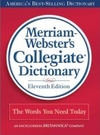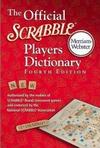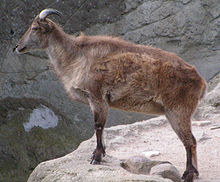Scrabble Apologetics II: The Dictionary
“You club and tournament players use all of those weird words in the Scrabble dictionary.” I hear this sort of thing a lot. XU and QAT are frequently mentioned. The implication is that these “weird words” aren’t really English, no one should be expected to know them, and that if we played with a “real dictionary,” it would be a better game.
This gets my tahr! (TAHR: n pl. -S, a goatlike mammal.)
Recently, after having played GIE and AIN in a friendly game of Bananagrams, I was told by a brother I shall not name that “I only play words that are found in Webster’s.”[1]
Well, why don’t we use Webster’s dictionary? Wouldn’t it be a better, fairer game if we played with a “real” dictionary?
Where to start, where to start?
See also Scrabble Apologetics I: Terminology
Webster Smebster
 First of all, there is no such thing as the mythical, universally-recognized “Webster’s Dictionary.” The term “Webster’s dictionary” is a generic trademark. Anyone is free to publish a dictionary and use some variation of “Webster’s dictionary” in the title. Most have. Three of the best-selling collegiate dictionaries in the U.S. use some form of the name. (Here they are listed with approximate numbers of entries in parentheses.)
First of all, there is no such thing as the mythical, universally-recognized “Webster’s Dictionary.” The term “Webster’s dictionary” is a generic trademark. Anyone is free to publish a dictionary and use some variation of “Webster’s dictionary” in the title. Most have. Three of the best-selling collegiate dictionaries in the U.S. use some form of the name. (Here they are listed with approximate numbers of entries in parentheses.)
- Merriam-Webster’s Collegiate Dictionary (165,000)
- Webster’s New World College Dictionary (150,000)
- Random House Webster’s College Dictionary (200,000)
Many lesser-known, collegiate-sized dictionaries use it as well. Both Webster’s New College and Webster’s II New College dictionaries exist. These are unrelated to each other, and unrelated to the Webster’s New World College Dictionary listed above. The confusion is intentional.
There is also a plethora of smaller dictionaries published using the generic Webster’s name. Merriam-Webster’s alone sells at least five editions that are in effect abridged versions of it’s collegiate dictionary (which is itself an abridgement of its unabridged Merriam-Webster’s Third New International Dictionary). These are the Compact, the Concise, the Pocket, the Dictionary of Basic English, and something known as Merriam-Webster’s Advanced Learner’s English Dictionary.
So in place of the Official Scrabble Player’s Dictionary (often abbreviated OSPD), which “Webster’s” should we use?
An unabridged, perhaps?
I listed best-selling collegiate dictionaries above for a couple of reasons. The second reason will be addressed below, but the first reason is that these are the dictionaries with which most of us are most familiar. I don’t know what the statistics are, but I’d bet my next paycheck that collegiate dictionaries outsell unabridged dictionaries 20-to-1. It’s probably closer to 100-1 (but I have plans for my next paycheck).
But Scrabble is a word game. A large vocabulary is supposed to be the sine qua non of the Scrabble pro, right? (Well, not necessarily, but that’s a different discussion.) Why not use an unabridged dictionary?
What is an unabridged dictionary, anyway? There’s the Oxford English Dictionary (the O.E.D.), of course. There are only two popular American English dictionaries published today that can fairly be described as unabridged:
- Merriam-Webster’s Third New International (470,000)
- Random House Webster’s Dictionary (315,000)
Two widely-available one-volume dictionaries don’t identify themselves as “college” dictionaries, and seem to occupy some middle ground between the collegiates and the unabridged:
- New Oxford American Dictionary (>250,000)
- American Heritage Dictionary of the English Language (>200,000)
A big, bad Scrabble dictionary?
A blurb used in advertisements for the OPSD exclaims that it features more than 100,000 playable two- through eight letter words! It is difficult to compare that count to actual dictionaries, which list numbers of entries rather than words (craft, crafts, crafter, crafters, crafting, crafty, craftier count as one, maybe two entries). And of course they include words unplayable in Scrabble (capitalized, hyphenated, and more).
The key thing to know is that the OSPD was originally, and is still, a compilation of words found in the four or five most popular American collegiate dictionaries. Never unabridged dictionaries.[2]
The more than 100,000 words in the OSPD should slightly exceed comparable (non-capitalized, etc) two- through eight-letter words found in the source collegiate dictionaries. This is because each of them contains a handful of unique entries, and because unique words found in one now-defunct source dictionary (the Funk& Wagnalls) remain in the OSPD.
Compared with the smallest unabridged or unabridged-ish dictionaries, the OSPD pales. The O.E.D.? Fuggetaboutit!
The Evolution of the Scrabble “Dictionary”
 The Official Scrabble Player’s Dictionary really isn’t worthy of the name. As a dictionary, it rots. But it is based on real dictionaries; it wasn’t created in the basement of some nerdy Scrabbler’s mom’s house, and as a wordlist suitable for Scrabble play, it’s a reasonable compromise. Here’s what I know about its evolution.
The Official Scrabble Player’s Dictionary really isn’t worthy of the name. As a dictionary, it rots. But it is based on real dictionaries; it wasn’t created in the basement of some nerdy Scrabbler’s mom’s house, and as a wordlist suitable for Scrabble play, it’s a reasonable compromise. Here’s what I know about its evolution.
The first Scrabble wordlist was created using Funk & Wagnalls Standard College Dictionary in the 1950s…
At this point I will just stop. Anyone interested in the history of the OSPD is almost certainly a club or tournament Scrabble player and has either read about it already or, more likely, is too busy studying stacks of 3x5” handmade cards with something like “EEGHNRT” on one side and “GREENTH” on the other.
The best source of this information is Steven Alexander’s Scrabble& FAQ Wikipedia’s Scrabble Dictionary page.
Parting shots
What about GIE and AIN, the words eliciting the “I only use words found in Webster’s” comment? In fact, these Scottish-English words aren’t holdovers from the last edition of Funk & Wagnalls (1973). Both are found in current editions of Merriam-Webster’s Collegiate Dictionary and Random House Webster’s College Dictionary. Thank the poetry of Robert Burns for these.
 Remember TAHR? Basically, a goat? Unless you are a Scrabble player or are more familiar with Asian mammals than most Americans, it may have been unfamiliar to you when you read it at the top of this page. You might even have thought of it as just one of those “Scrabble words.” On the other hand, you might have first come across it reading John Updike’s short story “Central Park,” and you might even have turned to your dictionary to look it up. If you had any one of Merriam-Webster’s Collegiate, Webster’s New World College, or American Heritage dictionaries at hand, there it was. If—God forbid—all you had was the OSPD, you’d have even found it there. But only because professional lexicographers put it there.
Remember TAHR? Basically, a goat? Unless you are a Scrabble player or are more familiar with Asian mammals than most Americans, it may have been unfamiliar to you when you read it at the top of this page. You might even have thought of it as just one of those “Scrabble words.” On the other hand, you might have first come across it reading John Updike’s short story “Central Park,” and you might even have turned to your dictionary to look it up. If you had any one of Merriam-Webster’s Collegiate, Webster’s New World College, or American Heritage dictionaries at hand, there it was. If—God forbid—all you had was the OSPD, you’d have even found it there. But only because professional lexicographers put it there.
—
Notes
- Here’s a clue to which brother: his first and middle names are both playable in Scrabble, which is more that can be said for either of mine. [^]
- The Scrabble dictionary was first published in 1978 and used as its sources The Random House College Dictionary (1968), The American Heritage Dictionary of the English Language (1969), Webster’s New World Dictionary (1970), Merriam-Webster’s Collegiate Dictionary (1973) and Funk & Wagnalls (1973).[^]
